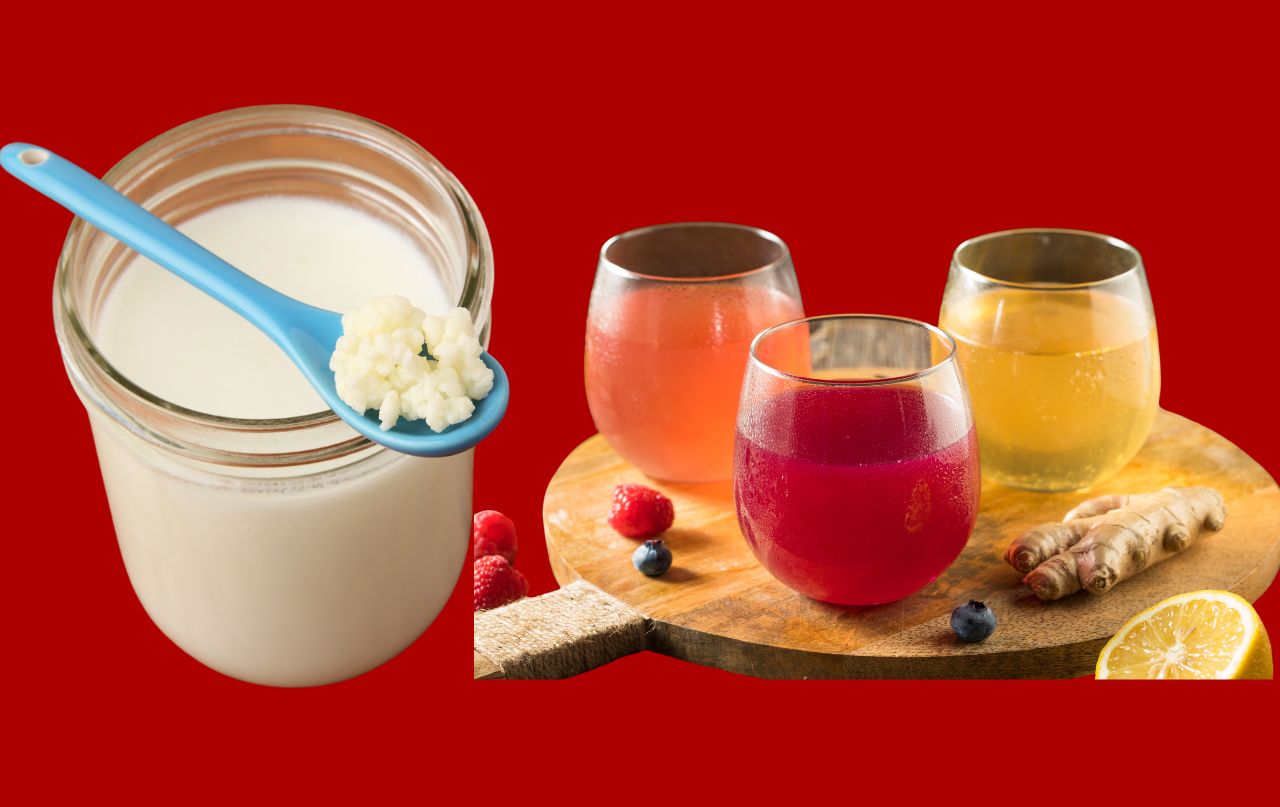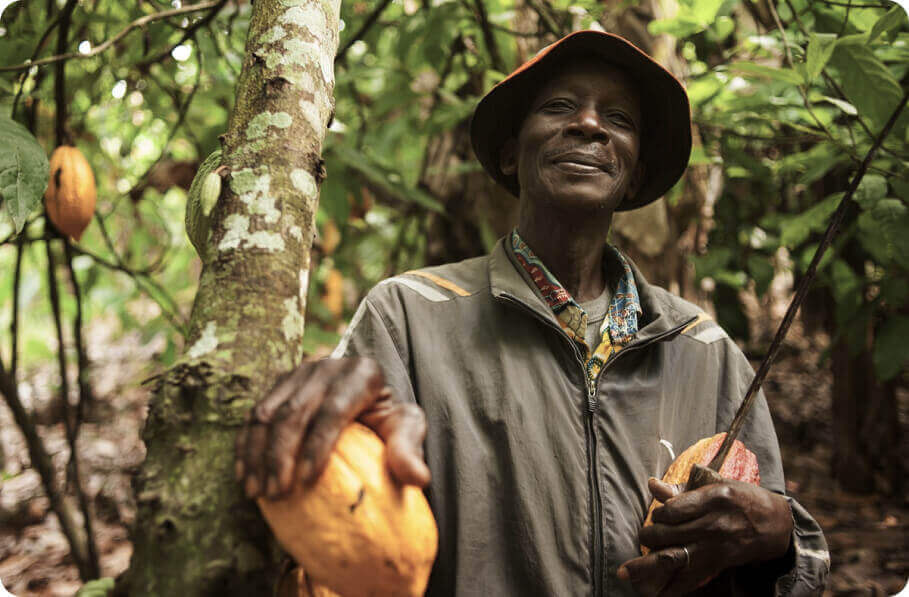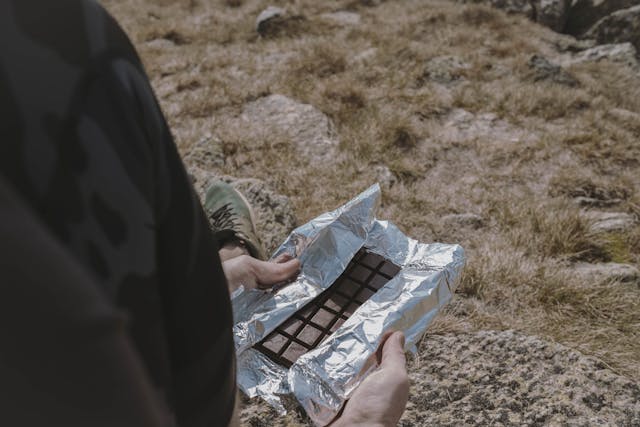
Kefir vs. Kombucha: Nutrition and Health Benefits
February 21, 2024
Beyond Fair Trade: Ensuring a Living Wage for Cocoa Farm Workers
March 8, 2024What Does Ethical Chocolate REALLY Mean?
Going Beyond Certifications
Ethical chocolate, bean to bar, tree to bar, slavery-free, sustainable… Do these chocolate buzzwords leave you scratching your head about their meaning?
We get ya. That’s why this article clarifies what some of the labels mean and guides you on how to buy truly ethical chocolate.
We also recommend brands who are actively fighting against the ethical issues plaguing this industry.
And believe it, these ethical issues are weighty. That’s one reason for all the fuss about ethical chocolate. Because responsible chocolate eating must include a concern about how manufacturers get their raw materials and how those raw materials are grown.
Bean to bar does not mean it’s ethical chocolate!
That’s right. Bean to bar just means the chocolate maker has control over the production of their bar from the raw cocoa bean as starting ingredient, instead of using intermediate products like cocoa powder or cocoa liquour. If their cocoa beans are unethically sourced, the bean to bar product is not ethical.
The same is true with the tree to bar label. Here, the chocolate maker is also the cacao farmer. Whether the chocolate is ethical depends on the cacao farming practices, NOT the chocolate-making process as the ethical issues in the chocolate industry are all on the side of cocoa production.
The good news is that most tree to bar makers have ethical reasons for choosing to farm their own cacao. So between a bean to bar vs. tree to bar options, your best bet for ethical chocolate should be a tree to bar product.
Organic chocolate is not the same as ethical chocolate
While some brands are both organic and fairtrade, the major concern of organic food certifications is environmental sustainability. As we clarify below, ethical chocolate has three faces.
So what does ethical chocolate mean?
Ethical chocolate is chocolate that is produced in a way that is socially responsible, economically fair, and environmentally sustainable.
Let’s break down these three aspects for better understanding.
Socially responsible: This means the cocoa beans used to make the chocolate are sourced from farms or cooperatives that don’t use child labour and where adult farm labourers work in safe conditions.
Economically fair: This ensures that the cocoa beans used to make the chocolate come from sources that pay cocoa farmers a fair price for their produce. Most certifications set a protective minimum price above market value besides a premium.
Environmentally sustainable: Cocoa beans come from sources that minimize harm to the planet in their farming and processing methods. These include regenerative agriculture and agroforestry.
These faces of ethical chocolate are knit together. When chocolate is not economically fair to begin with (the root cause of chocolate’s ethical issues), it discourages the social responsibility and environmental sustainability aspects.
The reason cocoa farmers use child labour or cut down forests is that they usually don’t make a living income from the meagre prices they get. Some don’t even recover the cost of production. Ethical sourcing of cocoa beans remains the only way to increase the income of these poor farmers.
READ ALSO: Is a Living Wage for Cocoa Farm Workers Possible?
You now understand why labels like bean to bar, tree to bar, or certified-organic don’t define ethical chocolate.
Which brings us to another potentially misleading label in the industry. Fairtrade.
Fair Trade chocolate may not be straightforward ethical chocolate
Now, checking for certifications on product labels (or claims of being fair trade for uncertified brands) is one way you can rise above the sea of cheap, unsustainable chocolate products. But it’s not always 100% foolproof. Fair trade chocolate is not always fair, unfortunately, because the fairtrade label can mean different things depending on who is granting the certification.
Knowing how these certifications work will help in understanding why fairtrade chocolate may not be fair.
Although there are many food certification schemes, the most known ones are Fairtrade International, Rainforest Alliance, Fair for Life, and the World Fairtrade Organization WFTO.
Each of these certification programs have their requirements and characteristics.
Fairtrade International
· Sets a minimum price for cocoa beans higher than market price, which helps to protect farmers from market price dips.
· Certifies both all-fairtrade-ingredient products and partially-fairtrade-ingredient products. This is not so good news.
· Allows certification for brands with as low as 20% of fairtrade sourced ingredients, meaning 80% might come from unethical sources.
Rainforest Alliance
· Certifies environmental sustainability practices in agriculture, including cocoa.
· Does not guarantee farmers minimum prices, unlike Fairtrade International.
Fair for Life
· Only certifies fully ethical brands, which is a great thing.
· Unfortunately, it leaves the premium and minimum price up for negotiation between buyer and seller, which, in case of imbalance of power, may defeat one purpose of fairtrade—ensuring the poor cocoa producer gets a fair income.
World Fairtrade Organization WFTO
· Uses peer reviews and independent audits to verify claims of ethical practices.
Individual certification schemes
Not all chocolate makers get approval from the above third-party schemes. Instead, you may come across companies with in-house certification standards. The problem with these unique schemes is that they’re not independent. It’s like you scoring your own work, which leaves room for biases that favour business interest over the welfare of the cocoa producer.
All this means that ethical chocolate goes beyond mere labels
That’s the simple truth ethical consumers must know. You can’t just depend on a label on a product to inform your choices unless you know exactly what that certification means, which many consumers may not know.
It also means that uncertified brands can still be ethical
Certifications cost money, a not always appealing route for small ethical brands whose strongest selling point are their transparent stories.
For example, though Bantu Chocolate is a fully ethical tree to bar brand, actively involved in challenging the ethical issues in the industry, we’ll not be going for third-party certification any time soon. We do not source our cocoa beans from third parties; we farm our cacao.
Learn more about our ethical practices.
Foregoing third-party certifications is true for a growing number of cacao-farming chocolate makers. When small brands can tell their own stories with transparency, costly third-party validation is money that can go to fill more pressing needs.
Why you should buy ethical chocolate, even though it’s not cheap
The challenges that make cocoa unsustainable can only be broken through ethical chocolate. At the root of these challenges is low farmer incomes. Cocoa farmers need a living wage that can discourage them from using child labour or felling down forests to cut costs and increase yields.
Although it’s more expensive, when you buy ethical chocolate, you’re helping make the cocoa supply chain equitable and cocoa production sustainable.
How do you know chocolate is ethically sourced?
There are a couple of ways you can tell if a chocolate brand sources its cocoa beans ethically. One is looking for certification logos on their products. The other is knowing the brand beyond mere labels. Since certifications can be vague and even confusing (if not manipulative), the surefire way to tell that a chocolate product comes from ethically sourced ingredients is to know the brand in and out.
Check their website and social handles, going beyond the product pages to learn their brand stories.
· Are they transparent about where their cocoa comes from?
· Do they only source beans from child labour-free farms and cooperatives?
· How do the farmers they cooperate with treat their labourers? Are there safe working conditions?
· Do they ensure eco-friendly farming practices and above-market prices for cocoa producers?
· What about the packaging material they use for final products? Eco-sustainable cocoa is not only about regenerative agricultural practices, but also environmentally friendly packaging for chocolates.
How to buy ethical chocolate
Buying ethical chocolate goes beyond looking for labels or claims of fairtrade. Certification standards vary, making it difficult for consumers to know what these labels actually represent. This means you have to know the brands you’re buying from to be sure you’re getting ethical chocolate. This may demand an extra effort, but knowing that your luxury indulgence supports sustainable practices is worth the effort.
Below are our recommendations on how to buy ethical chocolate.
· Know the brand you’re giving your money to: Ethical consumers don’t just grab a bar of chocolate off a supermarket shelf. Dig out a brand to know their practices before you hand them your money.
· Buy from fully ethical brands: If a brand has only a subset of its products certified fairtrade while its other products thrive on supply chains sustained by poor farmer conditions, would you buy their ‘ethical’ products? It sounds to me like their fairtraded products are just caving in to a particular segment of the market while the brand as a whole holds no ethical practices at heart.
There’s a growing number of ethical brands who are not just chocolate makers for the sake of chocolate, but fierce activists for positive change in the supply chain.
Some ethical chocolate makers going beyond fairtrade labels
There are many ethical chocolate makers in the UK and US, but we highlight the following brands for their extra-step story of being in the industry. Shortening the supply chain gives a chocolate manufacturer absolute freedom to ensure ethical practices are employed: children are protected, farmers receive decent incomes, and the environmentally stays safe.
Bantu Chocolate: Tree to bar chocolate maker, with farm in Cameroon and chocolate factory in London. Employs sustainable agricultural and eco-practices in cacao farming like regenerative agriculture, agroforestry, and solar energy. Our farm workers earn a living wage that is 3X above the fairtrade price and 6X above market prices.
This Brooklyn-based chocolate brand uses unroasted single-origin cacao beans to make naturally flavourful dark chocolate bars. As an ethical business, they source their cacao directly from single estate farms, farmer-owned cooperatives, and grower-centered organisations. Their small-batch productions make the traceability of their cacao beans possible while their chocolate is certified organic, ensuring environmental sustainability.
Beyond Good is a made-at-the-source chocolate brand. That is, they make (mostly) their chocolate in source countries, Madagascar and Uganda. The brand eliminates cocoa profiteering middlemen by sourcing their cacao directly from farmers. By producing most of their chocolate bars in cacao source countries, they offer full-time employment to locals which elevates the latter’s economic standards. BG also prioritizes organic cultivation, creating high-quality single-origin chocolates while supporting local communities and sustainable practices.
I bet you’ve not heard of commercial stone-ground chocolate. If yes, then you should get to know Taza Chocolate, an ethical brand located in Somerville, MA. Taza are pioneers in direct trade, paying a premium above the Fair Trade price for their cacao, and only collaborate with producers who respect the rights of workers and the environment.
Like Bantu Chocolate, L’Esterre Chocolate are cacao-farming ethical chocolate makers. They grow cacao on a generational family farm in Grenada and process cacao nibs at origin before crafting their chocolate in Cotswold, central South West England. As owners of their entire supply chain, they prioritize farming best practices, ensure quality production, and support their local community by processing cacao nibs in Grenada
For the past 13 years, Tony’s Chocolonely has been vocal about the child labour plague of the chocolate industry. Trading directly with farmers and cooperatives, the chocolate brand pays the Tony’s Premium, a living income model that considers cost of farming and household sizes to ensure strong farmers and healthy farms. Tony’s advocacy aims to see a future where it is possible to have all chocolate ethical, 100% slave-free, and fair for all stakeholders.
References
https://www.slavefreechocolate.org/ethical-chocolate-companies
https://en.wikipedia.org/wiki/Rainforest_Alliance#Sustainable_agriculture_certification
https://www.ethicalconsumer.org/food-drink/quick-guide-fair-trade-food
https://www.ethicalconsumer.org/food-drink/shopping-guide/ethical-chocolate
Chocolate Extinction: Fact vs. Fiction + What Chocolate Lovers Can Do
Chocolate ExtinctionFact vs. Fiction, What Consumers Can Do Share On Facebook Twitter Email Is the world really running out of chocolate? Not really. Currently the global […]
Corporate Chocolate Gifting Ideas to Appreciate Employees and Delight Clients
Corporate Chocolate GiftingHow to Appreciate Employees & Delight Clients Share On Facebook Twitter Email When it comes to corporate gifting, a one-gift-fits-all approach just doesn't cut […]
Cacao Supper Club at Home: Guide to Tasting Chocolate, Cacao Tea, and Pulp Juice
Cacao Supper Club at HomeGuide to Tasting Chocolate, Cacao Tea, and Pulp Juice Share On Facebook Twitter Email Imagine gathering around the table with a few […]





